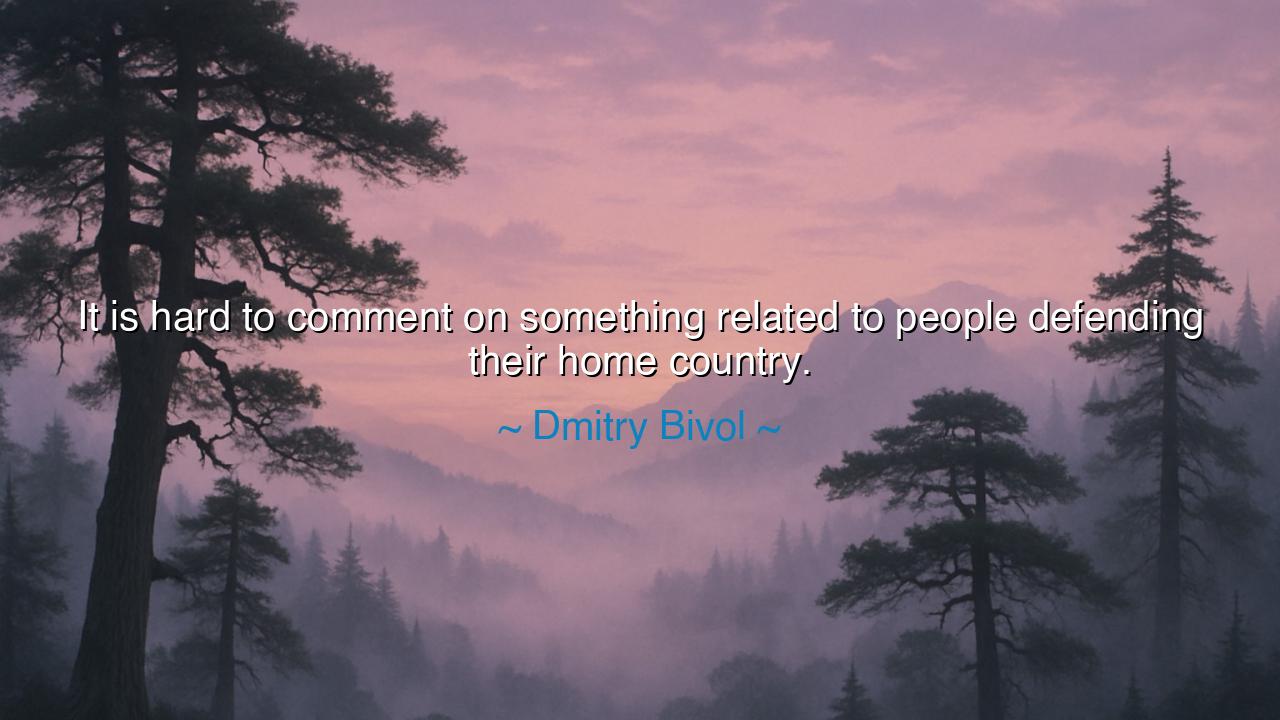
It is hard to comment on something related to people defending






In the solemn and measured words of Dmitry Bivol, the world champion boxer whose strength is matched by restraint, we find a truth of profound depth: “It is hard to comment on something related to people defending their home country.” Though spoken simply, these words carry the gravity of centuries—the weight of honor, loss, and the sacred bond between a person and the land that shaped them. They remind us that certain subjects lie beyond judgment or easy speech; that when human beings stand to defend their homeland, they enter a realm of experience that transcends politics and opinion. Bivol’s words speak not only as an athlete but as a man who understands the power and tragedy of loyalty—to one’s roots, one’s people, and one’s home.
Born in Kyrgyzstan and raised in Russia, Dmitry Bivol comes from a lineage of both struggle and pride. His heritage, shaped by the great expanse of Eurasia, taught him that the soil beneath one’s feet is not merely land—it is memory, identity, and belonging. When he says, “It is hard to comment,” he expresses reverence for the enormity of what it means to fight for one’s home. He acknowledges that to speak lightly of such matters would be to dishonor them. In a world of endless commentary, where words are cheap and judgments easy, his silence becomes a form of wisdom. To him, the defense of homeland is not a subject for debate, but for understanding—a sacred act that unites courage and sorrow in equal measure.
The ancients too knew that the defense of one’s home was the most profound of human duties. In Homer’s Iliad, warriors such as Hector did not fight for conquest or fame, but for the city of Troy, for the walls that sheltered their families, for the children playing in the courtyards, for the songs sung at dusk. When he said farewell to his wife and son before battle, Hector embodied the eternal truth of Bivol’s words: that the act of defending one’s homeland is so deeply personal, so intertwined with love and sacrifice, that it humbles all who look upon it. To comment on such devotion is to touch the edge of something sacred.
History too bears witness to this. Think of Leonidas and his 300 Spartans, who stood at Thermopylae not for glory, but to shield their homeland from destruction. Think of the farmers and poets who, in every land, have laid down their plows and pens to take up arms when their soil was threatened. Each knew that home is not merely geography—it is the cradle of memory, the altar of one’s ancestors, the breath of generations past. When men and women rise to defend it, they become part of something greater than themselves. This is why Bivol, a man of discipline and clarity, hesitates to speak; for he knows that words cannot fully grasp the magnitude of such devotion.
Yet in his restraint lies a lesson for our time. In an age when many speak swiftly and judge harshly, Bivol’s humility reminds us to approach the struggles of others with reverence. It is easy for the comfortable to comment on the suffering of the brave; harder is it to stand in silence and offer respect. The act of defending one’s home is born from love—the most universal of human forces—and thus deserves not cynicism, but empathy. When we witness others standing for their land, we should first remember our own—our own families, our own histories, the things we, too, would protect if they were threatened.
There is also an unspoken sorrow in his statement, for to speak of defending one’s home country is to speak also of war, of loss, and of human pain. To defend is to fight, and to fight is to risk everything. It is not a choice made in comfort, but in necessity. The ancient Chinese general Sun Tzu once said, “The soldier in desperate ground fights with the strength of ten.” Such strength is born not from anger, but from love—the love of all that cannot be replaced. Bivol’s hesitation to comment reveals that he sees both sides of this truth: the heroism and the heartbreak. He honors those who defend, but he also feels the cost of what they defend against.
So, my children of tomorrow, take from this the lesson of reverence and empathy. When you see others fighting for their home, do not rush to judge or speak; first, listen. Try to understand the stories carried in their hearts—the mothers they leave behind, the soil that shaped their childhoods, the songs of their ancestors. Remember that every nation, every people, is bound to its home by invisible threads of love. And should the day come when your own home is threatened—whether by war, injustice, or despair—may you find in your heart the same strength that moves those who defend theirs.
For in the end, Dmitry Bivol’s words are a reminder of humility: that there are moments in life when silence is the truest form of respect. To defend one’s homeland is to stand at the threshold of eternity, where words falter and only courage speaks. And it is not for the distant or the untested to explain what that means—it is only for them to honor it.






AAdministratorAdministrator
Welcome, honored guests. Please leave a comment, we will respond soon